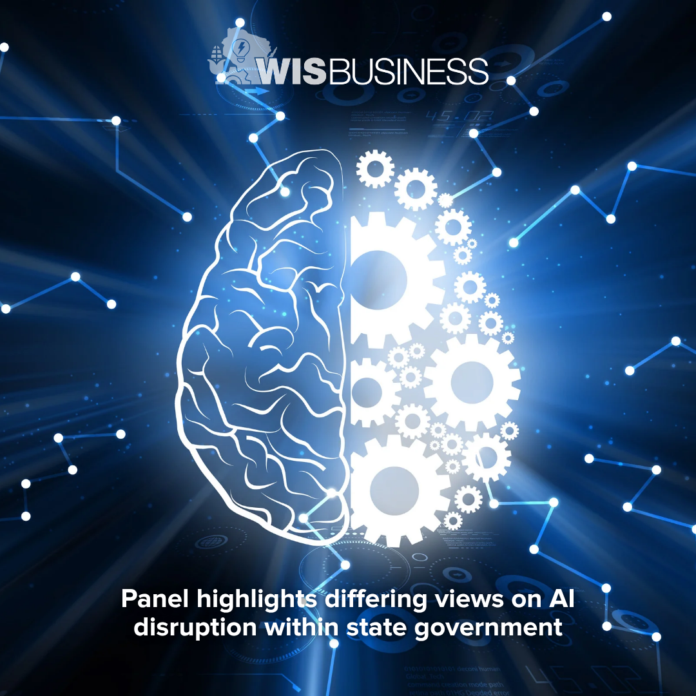A panel discussion around AI highlighted differing views on the technology’s potential for workforce disruption in Wisconsin, with some in state government more optimistic than others.
Yesterday’s WisBusiness-WisPolitics-State Affairs luncheon event was held in UW-Milwaukee’s Connected Systems Institute, which helps advance industrial technology applications with Microsoft’s help for manufacturers in the state. Panelists weighed in on how AI could affect future jobs in this sector, as well as how it’s already being used to solve business challenges.
When asked if people should fear losing their jobs due to AI, Department of Workforce Development Secretary Amy Pechacek said: “No. Absolutely not.”
“Humans have been flexible, have evolved with every industrial revolution,” she said. “Jobs have gotten better, more human-centric. Instead of crunching numbers, now we have Excel. Instead of doing taxing computer coding, now we have AI that will do that.”
She noted “there are still humans in the loop,” arguing their jobs are now more meaningful and interesting, and even pay better.
But Rep. Adam Neylon, vice chair of the Assembly Committee on Jobs and Economy, offered a more pessimistic outlook.
“There’s an economic principle known as creative destruction, and I think we’re going to go through that, where certain industries, certain jobs, will be destroyed,” the Pewaukee Republican said yesterday. “People will lose their jobs.”
While he expects new industries to crop up to replace those that get phased out, he said “there’s going to be a difficult transition period” between now and then.
“I think ultimately AI is going to be a tool to help people be more efficient in their job,” he said. “And I do think that it will lead to gains. But in the short term, there’s going to be layoffs.”
Still, both Pechacek and Neylon agreed a proactive approach is needed to ensure Wisconsin can handle the disruptions as well as opportunities stemming from AI.
Pechacek said the state has the potential to “bring everybody along” on its AI journey and avoid creating “another digital divide” that resulted from the earlier internet boom.
“There’s a seat at the table of prosperity for everybody, if we can uplift and create economic opportunity, train people for this new reality,” she said.
Meanwhile, Neylon argued the state shouldn’t attempt to protect industries that are “forced to adapt and change” due to AI, warning Wisconsin could be left behind.
“We will be passed up by other countries, other states, other people that are more adaptive, that aren’t trying to cling to the ways of the past, and are leaning into this creative destruction,” he said.
In response, Pechacek stressed the state government can help with that transition.
“I’m not saying protect outdated, antiquated jobs, I’m saying protect the people in those jobs by targeting them, upskilling them and helping them transition,” she said. “I don’t think, as a government, we need to just watch people suffer and let them languish, as prior industrial revolutions have allowed.”
Neylon — who was part of an AI task force assembled by Assembly Speaker Robin Vos, R-Rochester — emphasized the government’s role in protecting consumers and voters from being exploited by AI applications while avoiding creating a confusing patchwork of regulation for businesses.
The panel discussion also spotlighted RELY Contract Manufacturing in Menomonee Falls, which collaborated with the Connected Systems Institute on a new AI-based scheduling software.
Company President Katie Malnight-Meisinger said the application helps the business coordinate various complex manufacturing jobs, “so that we can get the product out the door in an efficient a way as possible while also increasing our bottom line as much as possible.”
The business handles secondary operations and value-added services to help its manufacturing clients meet the needs of their own customers, she explained. That includes building harnesses for large machinery, conducting third-party testing, providing fulfillment services and more.
The RELY team worked for more than eight weeks with partners at the institute’s AI Co-Innovation Lab, and developed a prototype version of the scheduling software that’s going to be integrated into the company’s operations.
Joe Hamann, executive director for the CSI at UW-Milwaukee, noted the central challenge being addressed with this AI application is common in the industry.
“Many manufacturers struggle with this,” he said yesterday. “I think what set RELY apart and gave them the ability to quickly identify the solution and implement it, is they have a lot of data. And their data is organized pretty darn well, which gave them an advantage.”
Malnight-Meisinger said this effort also helped the company cultivate internal expertise, as an employee working on the scheduling project is now applying what he learned to other areas of the business.
“What they’re doing is so unique, because it allows companies to enable individuals that may not have the educational background that traditionally would be getting these opportunities, to get this type of upskilling,” she said. “And now he’s developing his own AI platforms.”







